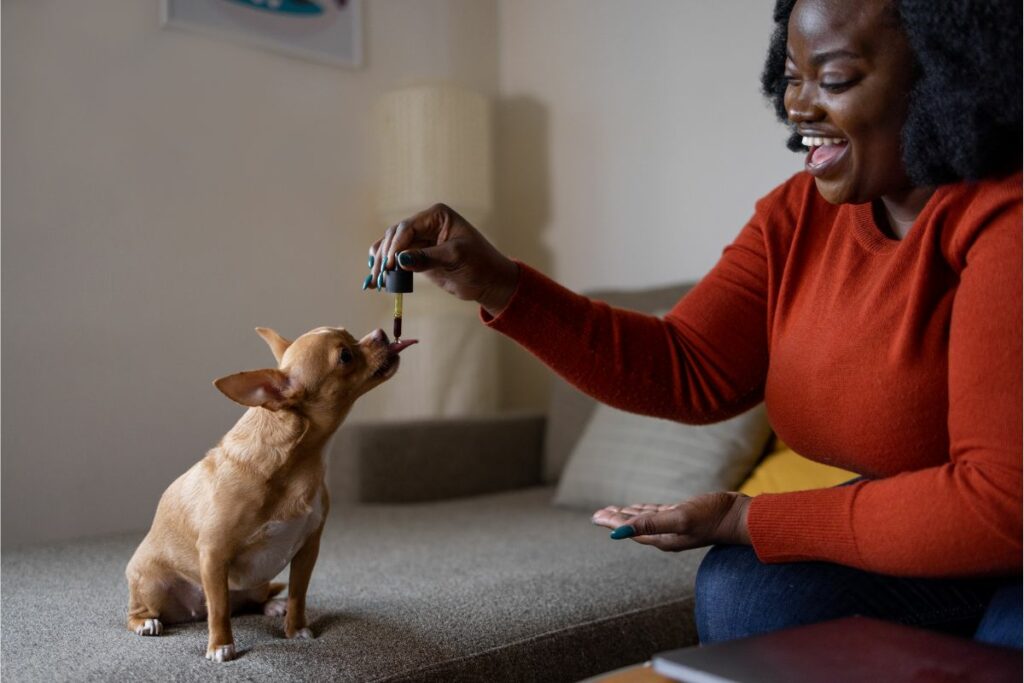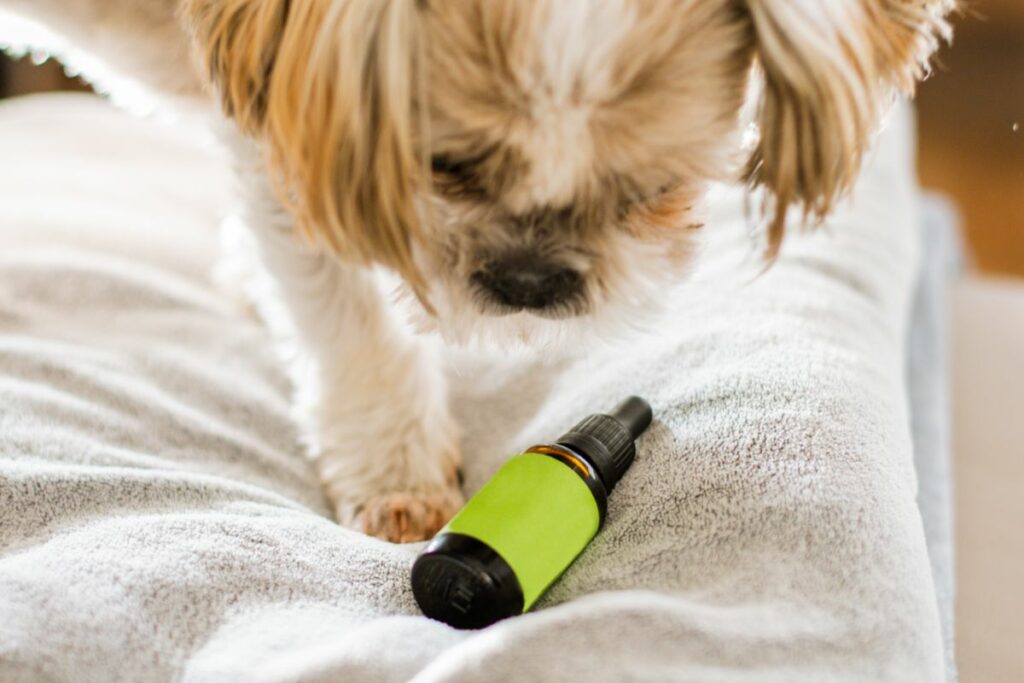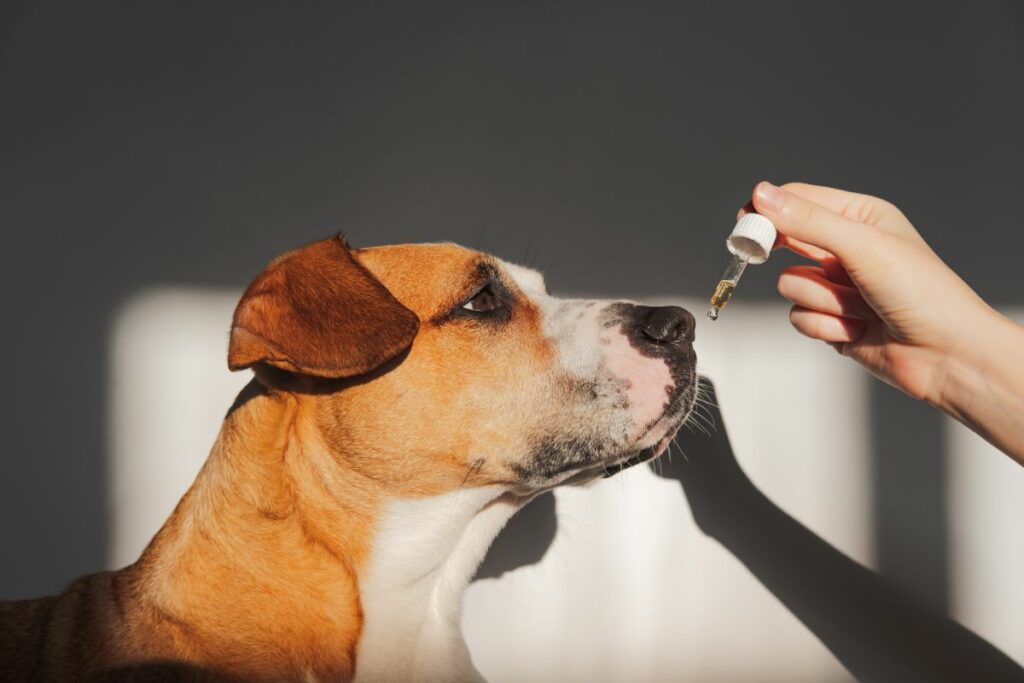If your dog is behaving aggressively, whether that’s towards you, other people, or dogs, it can be a real concern.
When we bring a dog into our lives, we want to love and care for them, but a display of aggression can create a rocky relationship.

There are many reasons that your dog may be aggressive, and understanding the reason behind the behavior is essential.
When you understand the root cause, you can support your dog with the right course of treatment or training.
One support option is CBD, which has purported benefits for helping dogs with aggression.
In this guide, we will delve more into why a dog might behave aggressively, and we will also look at how CBD can help.
Why Does A Dog Display Aggression?
Dogs may exhibit aggressive behavior for a number of reasons, and it’s important for an owner to understand what the root cause is in order to support the dog in healing the aggression:
A dog will commonly display aggression due to:
- Frustration: A dog that’s unable to do something it wants to do may display aggression due to frustration. This is sometimes known as barrier frustration or redirected aggression.
For example, if a dog is tied up, it may become frustrated and aggressive.
- Dominance: It’s common for dogs to exhibit aggression if they are exerting their dominance. Although this is usually directed towards other dogs, this aggression can also be shown towards humans.
For example, if your dog is trying to show another dog who’s boss, it could become aggressive. - Illness And Pain: Sudden aggression can often be a sign of pain or illness in your dog. Certain medical conditions can also lead to aggression.
If your dog is usually calm and becomes aggressive suddenly, it’s vital you speak to a vet.
- Fear: Fear aggression is common in rescue dogs. If a dog is frightened that it is under threat, it may respond with aggression.
Sadly, even when a rescue dog is rehomed, it can experience fear triggers.
- Possessiveness: Dogs can become aggressive when they are resource-guarding.
In other words, they become protective and possessive over an item they have – this could be a toy or food – or over their territory, or even their human.
Regardless of why your dog is displaying aggression, it’s important to seek professional advice. Left unchecked, a dog displaying aggression can become a very real danger to itself, other dogs, and people.
What Health Problems Cause Aggression?
Aggression in dogs can often occur because your dog is unwell or in pain, as we mentioned above.
As much as we would love them to be able to, dogs can’t tell us what they’re feeling or what’s wrong, so if they are unwell, it can manifest in different ways.
Health problems that can cause aggression can range from pain due to chronic diseases like arthritis to acute conditions such as injury.
Hormonal imbalances, certain types of infections, and even vision or hearing loss can cause a dog to act out aggressively because it feels vulnerable or threatened.
It’s essential to consult a veterinarian if a typically calm dog suddenly exhibits aggressive behavior. They might be suffering silently from an underlying health problem.
How Are Fear And Aggression Connected In Dogs?
Fear is a primary emotion in all animals, including dogs, that serves as a survival mechanism.
When a dog perceives something as a threat, whether it’s a real or perceived danger, its instinctual response can be to either flee (flight) or defend (fight).
Aggression, in many cases, is the manifestation of this fight response.
Several scenarios can trigger a fear response in dogs:
- Unfamiliar Situations: New environments or unfamiliar people and animals can be intimidating for dogs.
For example, a dog that has not been socialized might perceive a stranger or another dog as a threat and may react aggressively out of fear.
- Traumatic Past Experiences: Dogs that have had traumatic experiences in the past, perhaps due to abuse, abandonment, or accidents, can develop a heightened sense of fear.
An action or sound that reminds them of that trauma can trigger an aggressive response.
- Sudden and Loud Noises: Common noises like thunderstorms, fireworks, or loud vehicular noises can be terrifying for some dogs.
Their inability to comprehend the source or nature of these sounds can lead to a defensive, aggressive reaction.
- Protective Instincts: Dogs have inherent protective instincts, especially towards their territory or their human family members.
When they perceive someone or something as a potential threat to their home or loved ones, this protective nature can translate into aggressive behavior.
This is often mistaken for hostility, but at its core, it’s a fear-driven response.
Understanding the connection between fear and aggression is vital for pet owners.
By recognizing the signs of fear in their dogs – like tail tucking, excessive panting, trembling, or avoiding eye contact – they can preemptively address the situation and potentially prevent an aggressive episode.
Can You Give A Dog CBD?
Yes, dogs can be given CBD.
Cannabidiol (CBD) is a non-psychoactive compound found in the cannabis plant. In recent years, it has gained popularity for its potential therapeutic benefits, not just for humans but also for pets, including dogs.
Veterinarians and pet owners alike have been exploring the benefits of CBD to treat various ailments in dogs, ranging from anxiety to chronic pain.
Will CBD Help An Aggressive Dog?
CBD has the potential to help aggressive dogs by addressing issues such as pain or anxiety.
By promoting relaxation and reducing anxiety levels in dogs, CBD can potentially lessen the aggressive responses that are triggered by fear or discomfort.
However, it’s essential to understand that CBD is not a guaranteed cure for aggression and may work differently for each dog.
There are measures you should take alongside giving your dog CBD, such as proper training, to help with aggressive behavior.
Always consult with a veterinarian before introducing CBD to your dog’s routine.

What Is A Typical CBD Dose For Dogs With Aggression?
The ideal CBD dosage for dogs varies based on factors like the dog’s weight, age, and the specific ailment being addressed.
Generally, a common starting point is 1-2 mg of CBD per 10 pounds of the dog’s weight.
However, it’s crucial to consult with a veterinarian to determine the correct dosage for your dog and monitor their reactions to adjust the dose as necessary.
How Can I Administer CBD To My Dog?
We know how difficult it can be to give your dog medication, and CBD is no exception. But we have a few tried and tested ideas we can share to help you out:
First of all, it’s worth understanding your options in terms of the form the CBD can be given in.
Much like with human CBD supplements, you can give your dog its daily dose of CBD in the form of oils, treats, and capsules.
If your dog is okay with medication, and it’s safe for you to do so, you can administer the CBD oil tincture directly into your dog’s mouth.
If this isn’t an option, you can try popping a capsule into your dog’s food – although we know many dogs are experts at fishing out tablets, much to their owner’s frustration.
Another method would be to mix the oil directly in with your dog’s food – the tastier the food, the better.
CBD is also available in treat form, which is often the easiest way to give your dog its medication.
Are There Any Side Effects To Giving Your Dog CBD?
Like any supplement or medication, CBD can have side effects, though they are usually mild.
Potential side effects in dogs can include drowsiness, dry mouth, lowered blood pressure, and diarrhea.
If your dog shows any signs of these side effects or any other unusual behavior after consuming CBD, it’s important to consult with a veterinarian.
Are There Alternatives To CBD For Calming An Aggressive Dog?
While CBD is becoming increasingly popular for its potential calming effects on dogs, it’s not necessarily a stand-alone fix.
There are several other methods and treatments that can be explored to manage a dog’s aggression.
Each method has its advantages, depending on the root cause of the dog’s aggression and the individual dog’s temperament.
Let’s take a look at some of the alternatives or methods to complement CBD below:
- Behavioral Training and Therapy: This is one of the most recommended approaches for managing aggression.
Even if you are giving your dog CBD, we would still highly recommend looking into behavioral training to complement the treatment.
Training will help to address the underlying cause of aggression, whereas CBD will just help to treat the symptoms.
Professional dog trainers or animal behaviorists can provide insight into the root cause of aggression and offer structured training sessions to modify the dog’s behavior.
These sessions can include obedience training, socialization exercises, and desensitization techniques.
- Prescription Medications: Veterinarians can prescribe certain medications specifically designed to reduce anxiety or aggression in dogs. These can range from antidepressants to sedatives.
It’s crucial to monitor the dog closely when starting a new medication to ensure there are no adverse reactions.
Please note: It’s never an option to give your dog human sedatives or antidepressants to help with aggression. It’s imperative you speak to your vet for a proper diagnosis and recommended treatment.
- Natural Supplements: Apart from CBD, other natural remedies can promote relaxation in dogs. For instance:
- Valerian Root: Known for its sedative properties, it can help reduce anxiety and hyperactivity.
- Chamomile: Often used in teas for humans, chamomile can also be beneficial for dogs. It’s known to soothe the nervous system and can help with sleep.
- L-Theanine: This amino acid, commonly found in tea leaves, has been shown to produce a calming effect on the brain.
Again, it’s important to consult with your vet before you start to administer any of the above.
- Environmental Modifications: Creating a safe and comfortable environment can reduce potential stressors that might trigger aggression.
This can include providing a quiet space for the dog, using pheromone sprays or diffusers, and ensuring regular exercise and playtime. - Socialization: Exposing your dog to various environments, people, and other animals in controlled settings can help reduce fear and aggression over time.
- Use of Muzzles: No one wants to muzzle their pooch, but for dogs that have a history of biting, using a muzzle when in public or potentially triggering situations can prevent incidents.
It’s essential to ensure that the muzzle fits well and is used humanely, allowing the dog to breathe comfortably.
Your vet or local pet store should be able to help you identify the right muzzle for your dog.
- Keeping Your Dog on a Short Leash: When walking an aggressive or reactive dog, keeping them on a short leash gives the owner more control, especially in unpredictable situations.
It helps ensure that the dog doesn’t have the opportunity to lunge or approach other animals or people unexpectedly.
- Positive Reinforcement: Rewarding good behavior and providing consistent feedback can play a pivotal role in changing an aggressive dog’s behavior over time.
- Puzzle Toys and Mental Stimulation: Engaging a dog’s mind can be as essential as physical exercise.
Puzzle toys, treat-dispensing toys, and regular training sessions can keep a dog mentally stimulated, reducing boredom and potential anxiety.
- Regular Vet Check-ups: Sometimes, the root cause of aggression, as we’ve mentioned, can be an undiagnosed medical issue.
Regular vet visits can ensure that any health problems are detected early and addressed promptly.
How Else Can You Support An Aggressive Dog?
Dogs have a desire to please humans, and they just want to be loved and cared for in return.
One of the best possible things you can do for your aggressive dog is to show it love and to provide consistency.
Supporting an aggressive dog goes beyond merely administering CBD or other supplements.
Understanding the triggers of aggression, providing a safe environment, and investing in professional behavioral training can go a long way in helping an aggressive dog.
Socialization from a young age and consistent positive reinforcement can also help in managing aggressive tendencies.
Remember, be patient with your dog, seek the right advice and the right course of treatment, get your dog the training it needs, and provide it with a safe and secure home filled with an abundance of love and adequate resources.

Final Thoughts
Having a dog with aggressive tendencies or a dog that suddenly displays aggressive behavior is not easy.
As owners, it’s our duty and responsibility to understand why our pet is behaving the way it is and to do everything within our power to help.
Dogs may be aggressive due to fear or frustration, to display dominance, due to resource guarding, or because of ill health.
While CBD has shown to be helpful in calming dogs with aggression, this is just one option. And it should be given alongside training so that your dog is being supported in the long term.
Side effects of CBD are usually mild, but if your dog is unwell after a CBD dose or is displaying any unusual behavior, consult your vet ASAP.
If you have an aggressive dog, please speak to your veterinarian first before making any decisions – they will be able to advise you on the best course of action for both you and your dog.
Frequently Asked Questions
How does CBD oil make a dog feel?
There’s no THC present in CBD oil or treats, so your dog won’t get high, but they will feel calmer and more comfortable after taking their dose.
Should I give my dog CBD in the morning or night?
The best time to administer CBD to your dog will depend on several factors, and your vet will be able to give you the best advice on this.
However, many owners will give their dogs CBD in the morning with the dog’s breakfast.
How long does it take CBD to kick in for dogs?
According to Austin and Kat, a provider of CBD for dogs, it should take about 30-45 minutes for the CBD to kick in.
Oils generally work a little faster than treats.
How long does CBD stay in a dog’s system?
You can usually expect CBD to stay in your dog’s system for around 24 hours.
Is it bad to give your dog CBD every day?
As long as your vet has signed off on giving your dog CBD, it should be perfectly safe to administer this every day.
As we mentioned above, CBD will usually be in your dog’s system for around 24 hours, so re-dosing is necessary to manage their condition.
What are the symptoms of too much CBD in dogs?
An overdose of CBD can leave your dog feeling dizzy and disorientated, which can lead to falls. You may also notice vomiting or diarrhea.
If you think your dog has had too much CBD, or if your dog is exhibiting signs of an overdose or any unusual behavior, it’s important to take them to the vet as soon as possible.
- The Ultimate Guide To CBD for Dogs With Aggression - August 31, 2023
- The Ultimate Puppy Feeding Guide For New Owners - August 30, 2023
- A Guide To Group Dog Obedience Training - August 28, 2023
